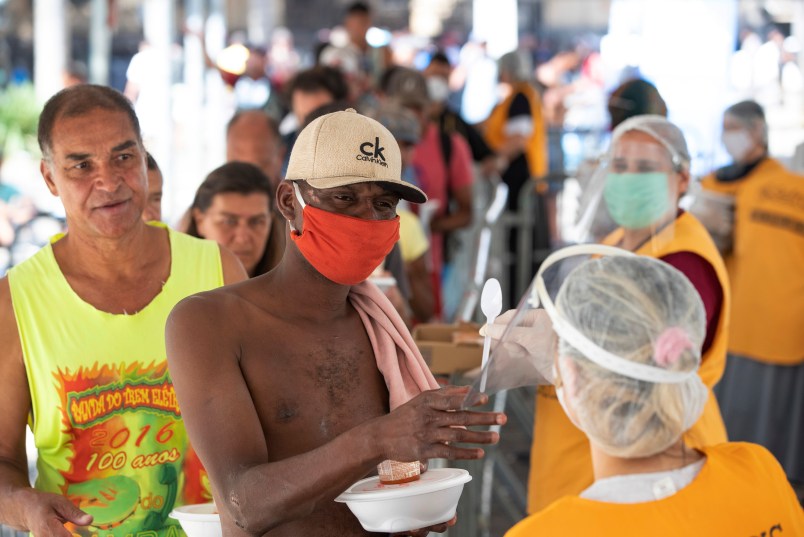RIO DE JANEIRO (AP) — Brazil is emerging as potentially the next big hot spot for the coronavirus amid President Jair Bolsonaro’s insistence that it is just a “little flu” and that there is no need for the sharp restrictions that have slowed the infection’s spread in Europe and the U.S.
As some U.S. states and European countries moved gradually Monday to ease their limits on movement and commerce, the intensifying outbreak in Brazil — Latin America ‘s biggest country, with 211 million people — pushed hospitals to the breaking point, leaving victims to die at home.
“We have all the conditions here for the pandemic to become much more serious,” said Paulo Brandão, a virologist at the University of Sao Paulo.
Brazil officially reported about 4,200 deaths and almost 62,000 confirmed infections, but the true numbers there, as in many other countries, are believed to be vastly higher, given the lack of testing and the many people without severe symptoms who haven’t sought hospital care.
Some scientists said over 1 million in Brazil are probably infected. and the crisis could escalate as the country heads into winter, which can worsen respiratory illnesses.
Worldwide, the death toll topped 200,000, according to a tally by Johns Hopkins University. The number of dead in the U.S. reached about 55,000 — close to the 58,000 U.S. troops killed during the Vietnam War. Italy, Britain, Spain and France accounted for more than 20,000 deaths each.
In other developments:
— In the U.S., the Trump administration worked to draw up new guidelines for how restaurants, schools, churches and businesses can safely reopen. The draft under consideration included suggestions such as closing break rooms at offices, using disposable menus in restaurants and having students eat lunch in their classrooms.
— British Prime Minister Boris Johnson returned to work after a bout with the virus and warned strongly against easing his own country’s lockdown too soon: “I refuse to throw away all the effort and the sacrifice of the British people and to risk a second major outbreak and huge loss of life.”
— In an unprecedented move, New York canceled its Democratic presidential primary, set for June 23, since Bernie Sanders has already conceded the nomination to Joe Biden.
In Brazil, Bolsonaro has disputed the seriousness of the coronavirus and said people need to resume their lives to prevent an economic meltdown. But most state governors in the country have adopted restrictions to slow the spread and pushed people to stay at home.
In mid-April, Bolsonaro fired his popular health minister after a series of disagreements over efforts to contain the virus, replacing him with an advocate for reopening the economy. Residents protested, leaning out their windows to bang pots and pans.
Medical officials in Rio de Janeiro and at least four other major cities have warned that their hospital systems are on the verge of collapse or too overwhelmed to take any more patients.
Officials in Sao Paulo — the largest city in South America, in a tightly packed metropolitan area of over 21 million residents, many of them living in poverty — have issued death certificates over the past two weeks for 236 people who succumbed at home, double the number before the outbreak, according to the SAMU paramedic service.
Manaus, an Amazon city of 1.8 million, recorded 142 deaths on Sunday, the most yet. In the main cemetery, workers have been digging mass graves. Brazil’s funeral industry warned last week that the city was running out of coffins and “there could soon be corpses left on corners.”
In the U.S., the governors of Nevada and Colorado announced that their states will join their three West Coast counterparts in coordinating their reopenings.
In Georgia, where Republican Gov. Brian Kemp has moved aggressively to let businesses reopen, restaurants received the go-ahead to resume dine-in service as long as they follow certain restrictions, including keeping tables 6 feet apart.
At Plucked Up Chicken & Biscuits in Columbus, Georgia, eight regulars showed up in the morning to have their coffee and breakfast and “chatted at each other across the room,” manager Alesha Webster said. But only 10 customers could be inside at a time, well below the capacity of 45.
Alex Brounstein, owner of the Atlanta-based chain Grindhouse Killer Burgers, had no plans to reopen right away. “You’re talking about people putting their mouths on things in your restaurant. You now have dirty dishes going back into your kitchen. To me, it’s just completely illogical,” he said.
Technology is likely to play an important role in helping countries ease their restrictions. Many countries, including Italy, France, Switzerland and Britain, are working on virus-tracking apps and other means of reducing the labor-intensive task of tracing infected people’s contacts.
In Australia, with about 80 COVID-19 deaths, 1.1 million of the country’s 26 million people downloaded a new contract-tracing app within 12 hours of its becoming available.
In another encouraging sign amid the gloom, New York state reported 337 deaths for the lowest daily count this month, down from a high of nearly 800 almost three weeks ago.
And Italy registered its lowest day-to-day number of new cases of COVID-19 since practically the first day the nation was put under lockdown in early March.
___
Biller and De Sousa reported from Rio de Janeiro and Geller from New York. Associated Press journalists around the world contributed to this report.
___
Follow AP pandemic coverage at http://apnews.com/VirusOutbreak and https://apnews.com/UnderstandingtheOutbreak



